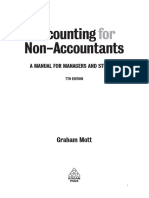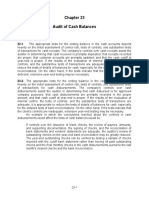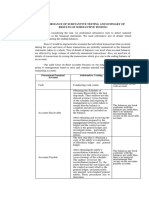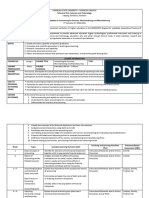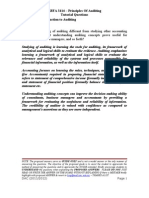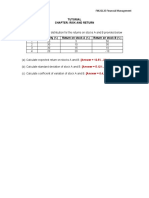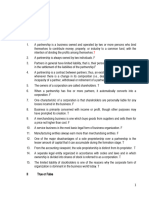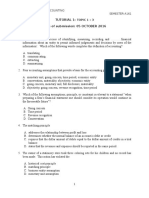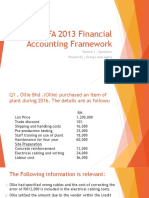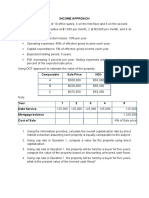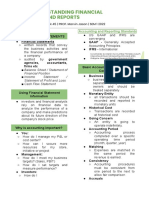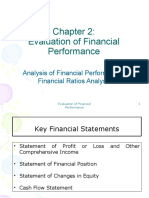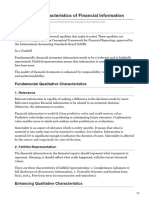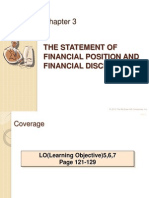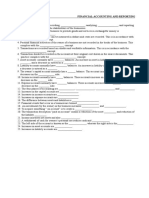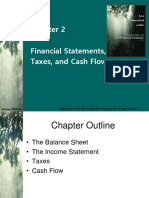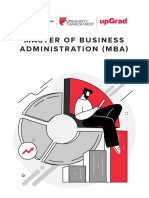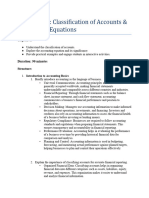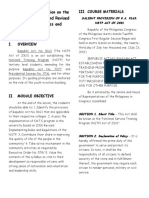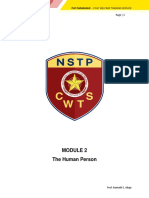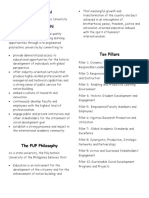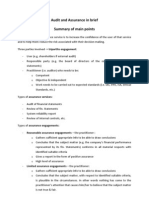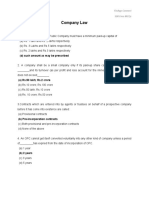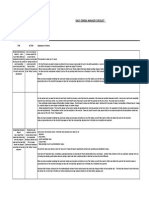Chapter 1 - Introduction To Accounting
Chapter 1 - Introduction To Accounting
Uploaded by
Patrick John AvilaCopyright:
Available Formats
Chapter 1 - Introduction To Accounting
Chapter 1 - Introduction To Accounting
Uploaded by
Patrick John AvilaOriginal Title
Copyright
Available Formats
Share this document
Did you find this document useful?
Is this content inappropriate?
Copyright:
Available Formats
Chapter 1 - Introduction To Accounting
Chapter 1 - Introduction To Accounting
Uploaded by
Patrick John AvilaCopyright:
Available Formats
Accounting Principles
ACCO 20213
UNIVERSITY OF THE PHILIPPINES
DILIMAN
Paul John Japson
SCHOOL OF Capote, LPT, MST-Math
STATISTICS
Instructor I
Polytechnic University of the Philippines—Parañaque City Campus
Chapter Outline
I. Introduction to Accounting
1. Need for Accounting
2. Why study Accounting
3. Definition of Accounting
4. Four Phases of Accounting
5. Fields of Accounting
6. Business Organizations
7. Business as an Accounting Entity
8. Transaction
9. Accounting Elements or Values
ACCO 20213—Accounting Principles
Need for Accounting
❑ Everyday transactions cannot be retained in the human brain for a quite period
of time without confusions and complications. To avoid these, transactions and
other important events should be recorded.
❖ Owner. “Has the business improved?”
❖ Management. “What are the resources of the business?”
❖ Prospect Investors. “Will my money grow in this business?”
❖ Creditors. “Can the business meet its obligation?”
❖ Employees. “Can we ask for more financial assistance?”
❖ Government. “Is this firm reporting the correct amount of
income?”
ACCO 20213—Accounting Principles
Why study Accounting?
❑ One should have an understanding of HOW data are gathered and
recorded in order to appreciate and understand the financial
reports of the business.
ACCO 20213—Accounting Principles
Definition of Accounting
According to Accounting Standards Council:
❑ Accounting is a service activity. The accounting function is to provide quantitative information,
primarily financial in nature, about economic entities, that is intended to be useful in making
economic decision.
According to the Committee on Accounting Technology of the American Institute
of Certified Public Accountants:
❑ Accounting is the art of recording, classifying and summarizing in a significant manner and in
terms of money, transactions and events which are in part at least of a financial character and
interpreting the results thereof.
According to the American Accounting Association:
❑ Accounting is the process of identifying, measuring and communicating economic information
to permit informed judgment and decision by users of the information.
ACCO 20213—Accounting Principles
Four Phases of Accounting
❑ Recording. This is technically called the bookkeeping. In this phase, business
transactions are recorded systematically and chronologically in the proper
accounting books.
❑ Classifying. In this phase, items are sorted and grouped. They may be classified
as asset accounts, liability accounts, capital accounts, revenue accounts and
expense accounts.
❑ Summarizing. After each accounting period, data recorded are summarized
through financial statements.
❑ Interpreting. Due to the technicality of accounting reports, the accountant’s
interpretation is needed. In this case, analysis reports are submitted together
with the financial statements.
ACCO 20213—Accounting Principles
Fields of Accounting
❑ Public Accounting
❖ Auditing. This is the principal service that a public accountant offers. In
making an audit, he carefully examines, tests, and checks the accuracy of
the reports and the financial data from which these reports were taken.
❖ Management Advisory Services. This includes the design, installation, and
improvement of the firm’s general accounting system and other system
deemed necessary for controlling and distributing manufacturing costs.
❖ Tax Services. This includes preparation and filing of income tax returns.
ACCO 20213—Accounting Principles
Fields of Accounting
❑ Private Accounting
❖ General Accounting. This includes the recording transactions and
preparing financial reports for the use of the management, owners,
creditors, governmental units, and other interested parties.
❖ Cost Accounting. This has to do with the controlling, determining, and
controlling costs particularly those costs in producing a product or service.
❖ Budgeting. This provides management a plan for future operations and
after this plan has been applied, summaries and reports comparing the
actual accomplishments with the plan are provided.
❖ Internal Auditing. Internal auditors see to it that the established
accounting procedures are being followed throughout the year.
ACCO 20213—Accounting Principles
Fields of Accounting
❑ Private Accounting
❖ Government Accounting. Accountants in private business firms also check and
audit the income, payroll, and tax returns submitted to the government.
❖ Accounting Education. Faculty members in Accounting in various colleges and
universities are Certified Public Accountants.
❖ Internal Accounting. This is concerned with the transactions and special
problems of multinational business organizations in their dealings in the
international trade.
❖ Internal Auditing. Internal auditors see to it that the established accounting
procedures are being followed throughout the year.
❖ Social Accounting. This involves the measurement of social costs and benefits
such as the measurement of traffic patterns for the most efficient use of traffic
funds
ACCO 20213—Accounting Principles
Business Organizations
❑ Ownership
❖ Single or Sole Proprietorship. Owned only by one person. Usually the owner is
also the manager of the business. He usually supplies the capital or borrow
funds from the banks or other lending institutions.
❖ Partnership. Owned by two or more owners. The owners, called partners,
agree on the capital contributions, management or the firm, distribution or
profits and losses, and other matters pertaining to the operation of the firm.
❖ Corporation. This is a business organization of not less than five persons. It is
organized by operation of law.
ACCO 20213—Accounting Principles
Business Organizations
❑ Nature of Business
❖ Service Concern. Deals with the rendering of services to the customers such as
tailoring shops, beauty shops, firms of CPAs, lawyers, doctors, and others.
❖ Trading or Merchandising. Deals with the buying of goods and selling the
same goods in the same form for profit such as sari-sari stores, department
stores, grocery stores, etc.
❖ Manufacturing Concern. Involves purchase of raw materials and converting
these raw materials into finished products such as textile manufacturing firms,
candy manufacturing firms, etc.
ACCO 20213—Accounting Principles
Business as an Accounting Entity
❖ Under this assumption, the entity is separate from the owners,
managers and employees who constitute the entity.
❖ The personal transactions of the owners shall not be allowed to
distort the financial statements of the entity.
❖ The shareholder is not the corporation and the corporation is not
the shareholder.
ACCO 20213—Accounting Principles
Transactions
❖ Are the data that we record in the accounting books.
❖ These are economic activities of the firm.
❖ External transactions (activities that involve one enterprise and another
enterprise); internal transactions (activities within the enterprise)
❖ In every transaction, there is always a value received and a value parted with
(like money, property, or services).
Transactions Value Received Value Parted With
1. Purchase tools for cash Tools Money
2. Purchased supplies on credit Office supplies Obligation or Debt
3. Paid the monthly telephone Services Money
bill
ACCO 20213—Accounting Principles
Accounting Elements or Values
❑ Elements directly related to the measurement of financial position
❖ Asset. A resource controlled by the entity as a result of past events and
from which future economic benefits are expected to flow to the entity.
▪ Current Asset. (PAS 1; Par. 66) The asset is cash or cash equivalent unless the asset
is restricted to settle a liability for more than twelve months after the reporting
period. The entity holds the asset primarily for the purpose of trading. The entity
expects to realize the asset within twelve months after the reporting period. The
entity expects to realize the asset or intends to sell or consume it within the entity’s
normal operating cycle.
▪ Noncurrent Asset. (PAS 1; Par. 66) Simply states that “an entity shall classify all
other assets not classified as current as noncurrent”.
ACCO 20213—Accounting Principles
Accounting Elements or Values
❑ Elements directly related to the measurement of financial position
❖ Liability. A present obligation arising from past events the settlement of
which is expected to result in an outflow from the entity of resources
embodying economic benefits.
▪ Current Liability. (PAS 1; Par. 69) The entity expects to settle the liability within the
entity’s normal operating cycle. The entity holds the liability primarily for the
purpose of trading. The liability is due to be settled within twelve months after the
reporting period. The entity doe not have an unconditional right to defer
settlement of the liability for at least twelve months after the reporting period.
▪ Noncurrent Liability. (PAS 1; Par. 69) provides that all liabilities not classified as
current are classified as noncurrent.
ACCO 20213—Accounting Principles
Accounting Elements or Values
❑ Elements directly related to the measurement of financial position
❖ Equity. Is the residual interest in the assets of the entity after deducting
all of the liabilities.
▪ Owner’s Equity in a proprietorship
▪ Partner’s Equity in a partnership
▪ Stockholders’ Equity or Shareholders’ Equity in a corporation
❖ Under PAS 1, paragraph 7, the holders of instruments classified as equity
are simply known as owners.
ACCO 20213—Accounting Principles
Accounting Elements or Values
❑ Elements directly related to the measurement of financial
performance
❖ Income. Increase in economic benefit during the accounting period in the
form of inflow or increase in asset or decrease in liability that results in
increase in equity, other than contribution from equity participants.
❖ Expense. Decrease in economic benefit during the accounting period in
the form of an outflow or decrease in asset or increase in liability that
results in decrease in equity, other than distribution to equity participants.
ACCO 20213—Accounting Principles
You might also like
- Accounting For Non-AccountantsDocument4 pagesAccounting For Non-AccountantsAnonymous ilWXWxgNo ratings yet
- Management Accounting: MBA First Year CR23Document28 pagesManagement Accounting: MBA First Year CR23Ajinkya NaikNo ratings yet
- Chapter 23 Solutions Manual ExamDocument15 pagesChapter 23 Solutions Manual ExamMariance Romaulina Malau67% (3)
- 13.performance of Substantive Testing and Summary of Results of Substantive TestingDocument3 pages13.performance of Substantive Testing and Summary of Results of Substantive TestingKen Aaron DelosReyes PedroNo ratings yet
- Accounts Receivable ManagementDocument19 pagesAccounts Receivable Managementjaeyun imnidaNo ratings yet
- CH - 01 - Accounting in Action (BUP) (EDITED)Document45 pagesCH - 01 - Accounting in Action (BUP) (EDITED)jimfinch512100% (1)
- Introduction To Financial Management (History, Nature and Significance of Finance)Document41 pagesIntroduction To Financial Management (History, Nature and Significance of Finance)Ronan PermejoNo ratings yet
- TUTORIAL 1 - Conceptual FrameworkDocument4 pagesTUTORIAL 1 - Conceptual Framework猪mongNo ratings yet
- Statement of Financial Position and Statement of Cash Flows-20240404075310Document89 pagesStatement of Financial Position and Statement of Cash Flows-20240404075310Jessy EmiliaNo ratings yet
- Course Syllabus in Accounting IDocument4 pagesCourse Syllabus in Accounting Igerwin gananNo ratings yet
- Tutorial Q A Abfa 3114 t1 t14 For Guide Only Tutors Copy PaDocument136 pagesTutorial Q A Abfa 3114 t1 t14 For Guide Only Tutors Copy PaHoshiko May Sin83% (6)
- Tutorial Chapter: Risk and Return: (Answer 12.5%, 20%) (Answer 5.12%, 20.49%) (Answer 0.4, 1.02)Document19 pagesTutorial Chapter: Risk and Return: (Answer 12.5%, 20%) (Answer 5.12%, 20.49%) (Answer 0.4, 1.02)FISH JELLYNo ratings yet
- Basic Accounting SlidesDocument61 pagesBasic Accounting SlidesSujitha Kummari100% (1)
- CH 1 Role of Managerial FinanceDocument38 pagesCH 1 Role of Managerial FinanceAkash KarNo ratings yet
- Introduction To AccountingDocument27 pagesIntroduction To Accountingdhanyasugukumar100% (2)
- ch02 The Recording ProcessDocument12 pagesch02 The Recording ProcessMạnh Hoàng Phi ĐứcNo ratings yet
- Financial Management SyllabusDocument3 pagesFinancial Management SyllabusAnh Nguyen Le HongNo ratings yet
- IGCSE Control AccountsDocument17 pagesIGCSE Control AccountsNipuni PereraNo ratings yet
- 12 Accountancy ch01 Test Paper 10 Capitalisation Method PDFDocument2 pages12 Accountancy ch01 Test Paper 10 Capitalisation Method PDFRicha SharmaNo ratings yet
- Chapter 1 Exercises - Overview of Accounting - AnswerDocument10 pagesChapter 1 Exercises - Overview of Accounting - AnswerFat Ajumma100% (1)
- Chapter 1. Presentation of ContentsDocument8 pagesChapter 1. Presentation of ContentsJason MablesNo ratings yet
- BKAL1013 Tutorial 1Document5 pagesBKAL1013 Tutorial 1syuhadaNo ratings yet
- FAFDocument8 pagesFAFShaminiNo ratings yet
- Accounting Equation and Double Entry BookkeepingDocument29 pagesAccounting Equation and Double Entry BookkeepingArvin Toralde100% (1)
- Lecture 10 - Prospective Analysis - ForecastingDocument15 pagesLecture 10 - Prospective Analysis - ForecastingTrang Bùi Hà100% (1)
- Chapter 3 Accounting For Branch Record ADocument14 pagesChapter 3 Accounting For Branch Record Aathirah jamaludinNo ratings yet
- A122 Exercises QDocument30 pagesA122 Exercises QBryan Jackson100% (1)
- MCQ History and Developement Accounting in MalaysiaDocument12 pagesMCQ History and Developement Accounting in MalaysiasyibiezNo ratings yet
- BBM 206 Principles of FinanceDocument46 pagesBBM 206 Principles of FinanceMzee KodiaNo ratings yet
- Exercise - Income ApproachDocument1 pageExercise - Income ApproachThùy Linh Vũ NguyễnNo ratings yet
- Part 3 - Understanding Financial Statements and ReportsDocument7 pagesPart 3 - Understanding Financial Statements and ReportsJeanrey AlcantaraNo ratings yet
- PMA Unit 5 Performance Management Planning PPT FinalDocument14 pagesPMA Unit 5 Performance Management Planning PPT FinalDr. smita choudharyNo ratings yet
- Chapter 3 Single Entry and Incomplete RecordsDocument36 pagesChapter 3 Single Entry and Incomplete RecordsAzyyati Mohamad UtamaNo ratings yet
- Maf253 Topic 2 Analysis of Financial Performance - Financial Ratio AnalysisDocument49 pagesMaf253 Topic 2 Analysis of Financial Performance - Financial Ratio AnalysisNUR IMAN SHAHIDAH BINTI SHAHRUL RIZALNo ratings yet
- Qualitative Characteristics of Financial InformationDocument2 pagesQualitative Characteristics of Financial InformationHamza AlBulushiNo ratings yet
- CH4 - Understanding Income StatementDocument64 pagesCH4 - Understanding Income StatementStudent Sokha Chanchesda100% (1)
- CH 3 - The Statement of Financial Position and Financial DisclosuresDocument37 pagesCH 3 - The Statement of Financial Position and Financial DisclosuresZulqarnain KhokharNo ratings yet
- 4.2 Accounting For Depreciation and Disposal of Non-Current AssetsDocument10 pages4.2 Accounting For Depreciation and Disposal of Non-Current Assetsnoahsilva374No ratings yet
- Financial Statements AnalysisDocument5 pagesFinancial Statements AnalysisShaheen MahmudNo ratings yet
- 11 Accountancy Keynotes Ch05 Depreciation Provision and Reserves VKDocument9 pages11 Accountancy Keynotes Ch05 Depreciation Provision and Reserves VKswadeshsxcNo ratings yet
- CHPT 19 Answer MFRS 118 Revenue-180214 - 050144Document3 pagesCHPT 19 Answer MFRS 118 Revenue-180214 - 050144Navin El Nino50% (2)
- Tutorial Chapter 4 - QDocument7 pagesTutorial Chapter 4 - QParthiban BanNo ratings yet
- ACCT 621 Practicing 1Document3 pagesACCT 621 Practicing 1Hashitha100% (1)
- Chapter 3 Statement of Cash FlowsDocument44 pagesChapter 3 Statement of Cash FlowsAklil TeganewNo ratings yet
- 1accounting Equation RevisedDocument4 pages1accounting Equation RevisedReniel MillarNo ratings yet
- AF301 Final Exam Semester 2, 2014Document8 pagesAF301 Final Exam Semester 2, 2014Anonymous 9dEMgo0No ratings yet
- 9706 Y16 SP 3Document10 pages9706 Y16 SP 3Wi Mae RiNo ratings yet
- Cost and Management Accounting - Course OutlineDocument9 pagesCost and Management Accounting - Course OutlineJajJay100% (1)
- ACCOUNTING 1 FINANCIAL ACCOUNTING AND REPORTING (Fill in The Blanks)Document1 pageACCOUNTING 1 FINANCIAL ACCOUNTING AND REPORTING (Fill in The Blanks)hahahahaNo ratings yet
- The Accounting Cycle:: Accruals and DeferralsDocument41 pagesThe Accounting Cycle:: Accruals and Deferralsmahtab_rasheedNo ratings yet
- Accounting Assignment 3 - FinalDocument21 pagesAccounting Assignment 3 - FinalMiia SiddiqiNo ratings yet
- Working With Financial StatementsDocument15 pagesWorking With Financial StatementsArush BhatnagarNo ratings yet
- Lecture - Notes On Accounting ProcessDocument7 pagesLecture - Notes On Accounting ProcessNica PunzalanNo ratings yet
- RWJ Chapter 2 Financial Statements and Cash FlowsDocument39 pagesRWJ Chapter 2 Financial Statements and Cash FlowsAshekin Mahadi100% (1)
- Tutorial 2 AnswersDocument6 pagesTutorial 2 AnswersBee LNo ratings yet
- Accounts For Joint Stock Companies: Equity FinancingDocument30 pagesAccounts For Joint Stock Companies: Equity Financingaruba anwarNo ratings yet
- Introduction To InvestmentDocument2 pagesIntroduction To Investmentsera100% (1)
- Mba UcwDocument21 pagesMba Ucwnaman singhNo ratings yet
- Session 2 Classification of Accounts - Accounting EquationsDocument6 pagesSession 2 Classification of Accounts - Accounting EquationssaadNo ratings yet
- FM& EE Module-2 Theory NotesDocument13 pagesFM& EE Module-2 Theory NotesDavid KiranNo ratings yet
- 01 Handout 1Document9 pages01 Handout 1glenettearizala18No ratings yet
- Day1 10daysaccountingchallengeDocument16 pagesDay1 10daysaccountingchallengeSeungyun ChoNo ratings yet
- Reviewer For MODULE 2 - CWTSDocument7 pagesReviewer For MODULE 2 - CWTSPatrick John AvilaNo ratings yet
- Reviewer For MODULE 1 - CWTSDocument13 pagesReviewer For MODULE 1 - CWTSPatrick John AvilaNo ratings yet
- Module 1 NSTP Law and Civic EducationDocument15 pagesModule 1 NSTP Law and Civic EducationPatrick John AvilaNo ratings yet
- Module 2 The Human PersonDocument10 pagesModule 2 The Human PersonPatrick John AvilaNo ratings yet
- PUP Vision, Mission, and Other ValuesDocument2 pagesPUP Vision, Mission, and Other ValuesPatrick John AvilaNo ratings yet
- Reviewer For CHAPTER 1 - Introduction To AccountingDocument5 pagesReviewer For CHAPTER 1 - Introduction To AccountingPatrick John AvilaNo ratings yet
- Chapter 2 - The Accounting EquationDocument28 pagesChapter 2 - The Accounting EquationPatrick John AvilaNo ratings yet
- Fisrt-Hand Information - ACCO 20213 Accounting PrinciplesDocument3 pagesFisrt-Hand Information - ACCO 20213 Accounting PrinciplesPatrick John AvilaNo ratings yet
- (GR 12 (RSCH-121) Week 1-20Document153 pages(GR 12 (RSCH-121) Week 1-20Patrick John AvilaNo ratings yet
- PhySci - Free Fall ModuleDocument5 pagesPhySci - Free Fall ModulePatrick John AvilaNo ratings yet
- Acc312 Platt Spr07 Exam1 Solution PostedDocument13 pagesAcc312 Platt Spr07 Exam1 Solution Posted03322080738No ratings yet
- Audit and Assurance in Brief Summary of Main PointsDocument4 pagesAudit and Assurance in Brief Summary of Main PointsAssen HalatchevNo ratings yet
- 530 Free MCQs by FinAppDocument116 pages530 Free MCQs by FinAppjanardhan CA,CS100% (1)
- Grant Mackay - Manulife, GPV Back To Basics, 26june2012Document13 pagesGrant Mackay - Manulife, GPV Back To Basics, 26june2012Laura StephanieNo ratings yet
- AbuegDocument10 pagesAbuegswit_kamoteNo ratings yet
- ERM AND IC STANDARDS-Emine ERSOZDocument46 pagesERM AND IC STANDARDS-Emine ERSOZgeraldine.cpsu18No ratings yet
- Welcome To ICSADocument16 pagesWelcome To ICSAAbhishek KhandelwalNo ratings yet
- Capacity ManagementDocument26 pagesCapacity ManagementGaurab NeogiNo ratings yet
- Business Account I 05 Gree I A LaDocument440 pagesBusiness Account I 05 Gree I A Lablu_qwertyNo ratings yet
- Corporate GovernanceDocument43 pagesCorporate Governancem_dattaias100% (1)
- Performance Task 1Document3 pagesPerformance Task 1Diana CortezNo ratings yet
- Ef 4010585063 Cv. Delta Surya PratamaDocument2 pagesEf 4010585063 Cv. Delta Surya PratamadtoxidNo ratings yet
- Classification of BudgetsDocument7 pagesClassification of BudgetsBen MathewsNo ratings yet
- Daily General Manager Checklist: Date: Property: GM NameDocument4 pagesDaily General Manager Checklist: Date: Property: GM NameGajanan Shirke AuthorNo ratings yet
- Certified Risk - Based AuditorDocument2 pagesCertified Risk - Based AuditorJohnny CervantesNo ratings yet
- Indzara Personal Finance Manager 2010 v2Document8 pagesIndzara Personal Finance Manager 2010 v2AlexandruDanielNo ratings yet
- GVK PDFDocument138 pagesGVK PDFSUKHSAGAR1969100% (1)
- Cost Accounting and Control/ Strategic Cost ManagementDocument41 pagesCost Accounting and Control/ Strategic Cost ManagementEy EmNo ratings yet
- Audit Problem UzDocument7 pagesAudit Problem UzRaies JumawanNo ratings yet
- Unit 2 Risk Assessment and Internal ControlDocument11 pagesUnit 2 Risk Assessment and Internal ControlDivyasree DsNo ratings yet
- Fundamentals of Assurance ServicesDocument22 pagesFundamentals of Assurance ServicesxxpinkywitchxxNo ratings yet
- Bow Intern2Document19 pagesBow Intern2bonalege123No ratings yet
- Cashflow ManagementDocument7 pagesCashflow ManagementmohamedNo ratings yet
- Tables T077S & T077Z (Acct ..Document3 pagesTables T077S & T077Z (Acct ..vlsharma7No ratings yet
- DDUGJY GuidelinesDocument44 pagesDDUGJY GuidelinesHasard AhmadNo ratings yet
- Kota Satu Properti - Annual Report 2020 02.06.2021Document224 pagesKota Satu Properti - Annual Report 2020 02.06.2021Clarisa PragitaNo ratings yet
- IFRS 16 Example: Initial Measurement of The Right-Of-Use Asset and Lease Liability (Quarterly Payments)Document4 pagesIFRS 16 Example: Initial Measurement of The Right-Of-Use Asset and Lease Liability (Quarterly Payments)Ankit ShahNo ratings yet
